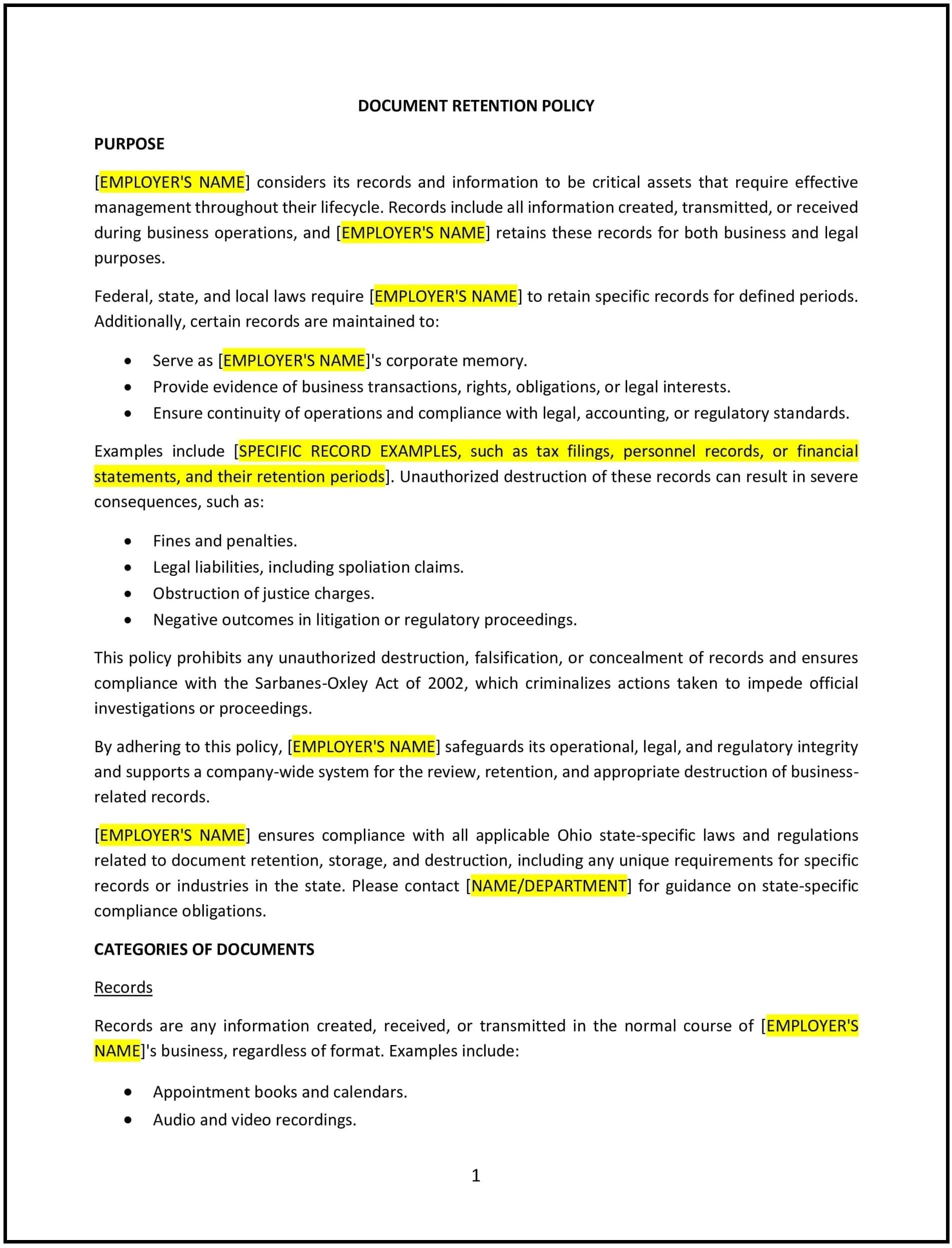Got contracts to review? While you're here for policies, let Cobrief make contract review effortless—start your free review now.

Customize this template for free
Document retention policy (Ohio)
A document retention policy provides Ohio businesses with a clear framework for managing the retention, storage, and disposal of business documents. The policy outlines the types of documents that must be retained, the retention periods for each document category, and the processes for securely storing and eventually discarding outdated documents. This ensures that businesses comply with Ohio state laws, industry regulations, and best practices regarding recordkeeping, while also safeguarding sensitive and confidential information.
By implementing this policy, Ohio businesses can maintain organized and compliant record-keeping systems, reduce the risk of data breaches, and ensure that documents are retained for the required time frames.
How to use this document retention policy (Ohio)
- Define document categories: The policy should specify which types of documents are subject to retention, such as financial records, employee files, contracts, legal documents, and communications. It should also categorize documents based on their importance and relevance to legal or business requirements.
- Set retention periods: Clearly define the retention period for each category of documents based on legal and regulatory requirements. For example, tax documents may need to be retained for seven years, while certain HR documents may need to be kept for a longer period. The policy should also provide guidance on when documents can be destroyed.
- Establish storage methods: The policy should specify how documents will be stored, whether in physical or electronic form. It should outline appropriate security measures, such as access controls, encryption, or locked storage, to ensure that sensitive information is protected.
- Define destruction procedures: The policy should specify how documents will be safely disposed of once the retention period has expired, including shredding paper documents, securely wiping electronic files, and ensuring compliance with Ohio state and federal data disposal laws.
- Ensure compliance with laws and regulations: The policy should align with Ohio state laws and federal regulations governing document retention, including the Sarbanes-Oxley Act, HIPAA, or other industry-specific laws. It should clarify the legal obligations regarding record-keeping and destruction.
- Set guidelines for special records: The policy should address special considerations for specific records, such as those involving legal disputes, pending litigation, or audits. These records may require extended retention periods and special handling procedures.
- Assign responsibilities: The policy should designate specific employees or departments responsible for overseeing document retention, ensuring that all records are properly maintained, and overseeing the destruction process.
- Regularly review and update the policy: The policy should be reviewed periodically to ensure it remains compliant with Ohio state laws, evolving business needs, and industry best practices for document retention and security.
Benefits of using this document retention policy (Ohio)
This policy provides several key benefits for Ohio businesses:
- Maintains compliance: The policy helps businesses comply with Ohio state laws and federal regulations related to record-keeping, reducing the risk of fines, penalties, or legal issues.
- Reduces legal risk: Proper retention and secure disposal of documents reduce the risk of inadvertently retaining documents that could become liabilities or contribute to legal disputes.
- Protects sensitive information: By outlining secure storage and disposal practices, the policy helps protect sensitive business and personal data, reducing the risk of data breaches or identity theft.
- Increases operational efficiency: Clear guidelines on document retention and destruction ensure that employees can easily locate and manage records, improving workflow and operational efficiency.
- Supports audits and investigations: Well-organized records allow businesses to quickly respond to audits, investigations, or legal inquiries, ensuring transparency and accountability in business practices.
- Saves storage space: By defining retention periods and procedures for document disposal, businesses can reduce the volume of physical and electronic records, saving storage space and costs associated with maintaining unnecessary records.
- Demonstrates good governance: A clear and effective document retention policy reflects well on the company’s governance practices, showing stakeholders that the business is well-managed and diligent about its compliance obligations.
Tips for using this document retention policy (Ohio)
- Communicate the policy clearly: Ensure that employees understand the document retention policy by including it in the employee handbook, providing training, and holding regular refresher sessions on the policy’s requirements.
- Keep track of retention periods: Use document management software or spreadsheets to keep track of the retention periods for various documents and ensure they are disposed of at the appropriate times.
- Ensure secure storage: Implement appropriate security measures to protect confidential and sensitive documents, whether they are stored physically or electronically. This includes using locked file cabinets for paper records and encryption for digital files.
- Train employees on data disposal: Provide training on the proper methods of securely disposing of documents, including shredding paper documents and securely deleting digital records, to avoid any risk of information leakage.
- Review document categories regularly: Periodically review the document categories to ensure that they are up-to-date with any changes in Ohio state laws or business practices that may affect the types of records the business needs to retain.
- Assign clear responsibilities: Designate specific employees or departments to oversee the document retention process, ensuring accountability and consistency in following the policy.
- Regularly audit document retention practices: Perform regular audits to ensure that the business is adhering to the retention schedules, secure storage protocols, and disposal procedures outlined in the policy.